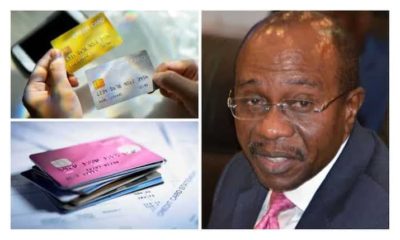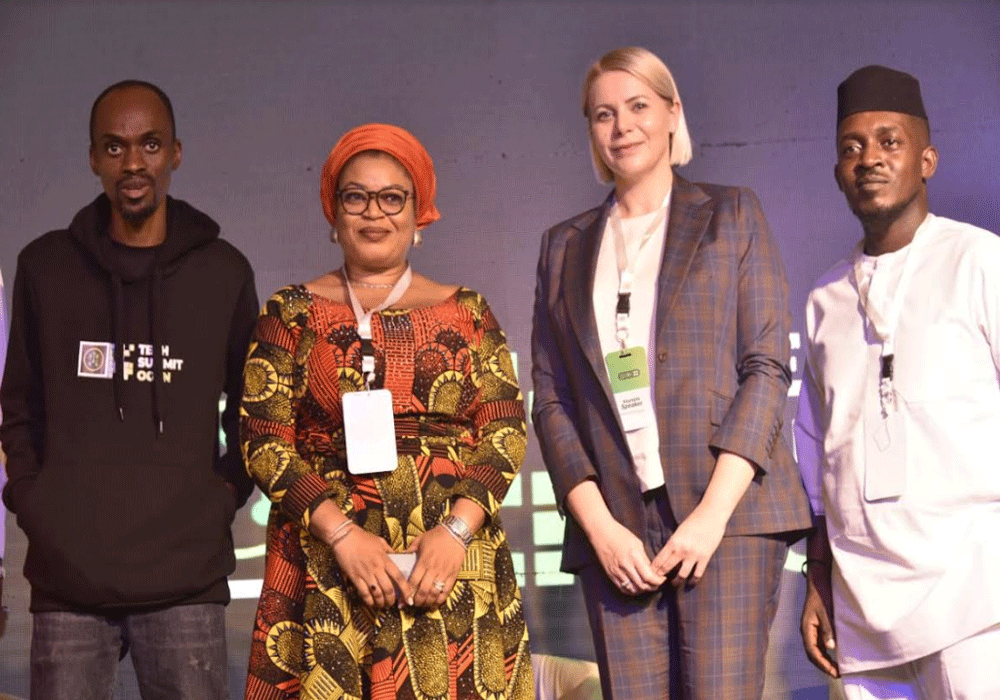Finance
PSBs Are Critical Drivers of Financial Inclusion – 9PSB CEO

By Edozie Obasi-Eze
The Chief Executive Officer, 9PSB, Branka Mracajac considers that the importance of Payment Service Banks (PSBs) in supporting the financial inclusion drive cannot be overemphasised.
According to her, PSBs offer last mile delivery of financial solutions to the unbanked, under-banked and underserved who in most cases are neglected due to geographical and infrastructural barriers.
Mracajac made the assertions, on Thursday, while delivering a keynote presentation, “The Role of Payment Service Banks within the Financial Ecosystem in Nigeria”, at the 2021 Committee of e-Business Industry Heads, CeBIH retreat in Abeokuta.
She expressed the thoughts that Nigeria had made considerable progress in developing a strong financial inclusion framework, though a lot still needed to be done in ensuring that the common man isn’t left out of the financial ecosystem.
She said, “From 2012 we have seen an appreciable progress in the country’s financial inclusion implementation journey.
“No doubt, the licensing of Payment Service Banks is impacting significantly on the inclusion drive.
“As at today, we are seeing an increase in the numbers of those who are financially included.
“However, more than 1 in 3 Nigerian adults remain completely financially excluded. It’s a huge number that needs to be addressed and at 9PSB, we are committed to providing access to everyone, especially to the neglected and underserved population through our network of agent partners.”
She emphasised the need for industry stakeholders to collaborate to deliver seamless and enhanced financial services that address specific needs of every market segment.
“We recently went into a partnership agreement with Flutterwave to create a seamless payment ecosystem. With the partnership, we are aggregating and simplifying transactions for banking agents, merchants, and consumers; Simply put, they now have a single point of entry to enjoy the various products and services provided by Flutterwave and 9PSB.” she explained.
The Deputy Governor, Ogun State, Noimot Salako-Oyedele had in her remarks disclosed that the State Government was looking to collaborate with fintech players to ease cash transfer services in the State.
She challenged participants at the retreat to come up with solutions that would help support financially excluded Nigerians not just in the state but across the federation.
The CeBIH retreat is a platform to examine key innovations in payment industry over the past year and discuss insights and trends for the coming year.
This year’s retreat tagged, ‘Innovative Digital Banking’ focused on issues around the growth of digital payments in Nigeria and how technological innovations such as digital currencies, blockchain, 5G network, contactless payments, among others, will dominate the payment industry in the coming years.
The retreat attracted key stakeholders and dignitaries including, the Deputy Governor, Financial Systems, Central Bank of Nigeria, Aishah Ahmad, Chairman, Nigerian Communications Commission, Prof. Adeolu Akande, Director, Payments System Management, Central Bank of Nigeria, Musa Jimoh, Managing Director, Globus Bank Limited, Elias Igbinakenzua and the Managing Director, Nigeria Inter-Bank Settlement System Plc, Premier Oiwoh.
Business
Nigeria pays US$4.9 billion on petrol subsidy in 2024- NNPCL
It was however noted by Biztellers.com.ng, that although subsidy is back in effect, the main reason for that is the increasingly weak state of the Naira and the country’s extreme dependence on products importation. Also unlike the previous subsidy era, where several oil marketers were getting free subsidy refunds for unverified product importation, this subsidy era is witnessing only one importer, the NNPCL, which in effect is the sole receiver of government subsidies.
Yemie ADEOYE
INSPITE of the official position of the Nigerian government that the controversial petrol subsidy is gone for good as announced by the President on assumption of office, the state owned Nigerian National Petroleum Corporation Limited, NNPCL has disclosed that petrol subsidy is still fully operational in Nigeria, although, under a different identity.
Umar Ajiya, Chief Financial Officer at the NNPCL, disclosed that it cost the company a staggering N7.8 trillion (US$4.9) to cover this price gap in the first seven months of 2024.
Rather than simply referring to these claims as subsidies, he stated that the company is merely managing the price difference in petrol imports on behalf of the federation, stressing that this should not be misconstrued as a return to subsidy payments.
![]() This revelation has reignited discussions on whether the NNPC is indirectly offering subsidies, a concept typically defined as selling a product below its cost price.
This revelation has reignited discussions on whether the NNPC is indirectly offering subsidies, a concept typically defined as selling a product below its cost price.
Documents reviewed by Biztellers.com.ng showed that the term “subsidy” was used extensively in official correspondence between the NNPCL and the presidency, particularly in reference to the “shortfall.”
Recall that President Bola Tinubu reportedly approved NNPC’s request to utilize the 2023 final dividends due to the federation to offset these costs.
However, during a media briefing on Monday about the company’s 2023 audited financial statements, Ajiya refuted claims that the NNPC is involved in any subsidy scheme.
Ajiya further disclosed that the Nigerian government owes the NNPC N7.8 trillion ($4.9 billion) in subsidy-related debts for the period from January to July 2024.
In furtherance of his clarification to the News Agency of Nigeria (NAN), Ajiya insisted that no subsidy payments have been made to any marketer in the last nine years, citing the NNPC’s role as the sole importer of petrol under supply contracts.
He said, “In the last eight to nine years, NNPC Ltd. has not paid anyone a dime as a subsidy; no kobo has been disbursed by NNPC Ltd. in the name of subsidy. No marketer has received any payment from us for subsidy.”
“What has been happening is that we have been importing PMS, which has been landing at a specific cost price, and the government tells us to sell it at half price. So the difference between the landing price and that half price is a shortfall.
“And the deal is between the Federation and NNPC Ltd., to reconcile, sometimes they give us money, so there is no money exchanging hands with any marketer in the name of subsidy.”
Ajiya remained silent on how much of the $4.9 billion could have been remitted to the federation account if the NNPC had not been covering the “shortfall.”
It was however noted by Biztellers.com.ng, that although subsidy is back in effect, the main reason for that is the increasingly weak state of the Naira and the country’s extreme dependence on products importation. Also unlike the previous subsidy era, where several oil marketers were getting free subsidy refunds for unverified product importation, this subsidy era is witnessing only one importer, the NNPCL, which in effect is the sole receiver of government subsidies.
Banking
CBN Denies Currency Devaluation

The Central Bank of Nigeria (CBN) has refuted claims of devaluing the.
Earlier reports suggested that the CBN had devalued the Naira, lowering its exchange rate from N631 to the dollar, compared to the previous day’s rate of N461.60 at the Importers and Exporters (I&E) window.
However, the Central Bank of Nigeria (CBN) released a statement on Thursday through its Acting Head of Corporate Communications, Dr. Isa Abdulmumin, categorizing the report as false information.
In the statement titled ‘CBN Has Not Devalued The Naira’, he said the attention of the apex bank was drawn to the news report by an Abuja based newspaper edition of June 1, 2023, titled “CB Devalues Naira To 630/51”.
However, the CBN stated categorically that the news report was replete with outright FALSEHOODS and destabilizing innuendos, ‘reflecting potentially willful ignorance of the said medium as to the workings of the Nigerian Foreign Exchange Market.’
“For the avoidance of doubt, the exchange rate at the Investors’ & Exporters (I&E) window traded this morning (June 1, 2023) at N465/USS1 and has been stable around this rate for a while.
“The public is hereby advised to ignore the news report by Daily Trust in its entirety, as it is speculative and calculated at causing panic in the market,” the CBN spokesman added.
He, therefore, advised media practitioners to verify their facts from the Central Bank of Nigeria before publishing in order not to misinform the public.
Banking
BREAKING: CBN Increases Interest Rate By 0.5%

The interest rate in Nigeria has been raised to 18.5 percent, up by 0.5 percent, from 18 percent where it was pegged in March 2023.
The Central Banks of Nigeria’s (CBN) Monetary Policy Committee (MPC) resolved to this effect at its third meeting of 2023 in Abuja, on Wednesday.
Governor, CBN, Godwin Emefiele, made the disclosure in the communiqué of the MPC’s meeting, thereafter.
While engaging the media at the end of the two-day meeting, Emefiele, said the committee voted to keep the asymmetric corridor at +100 and -700 basis points around the MPR.
In the view of the MPC, rising inflation rate is traceable to the high energy cost and challenges around the supply chain, among others, which lie outside the corridors of the CBN.
Emefiele said, “The current trend in price development would continue to be monitored by the bank with greater collaboration with fiscal authority to address the drivers of inflation.”
Biztellers reports that the CBN had effected six consecutive interest rate increases, which has seen the rate move from 11.5 percent in March 2022 to 18.5 percent in May 2023.















